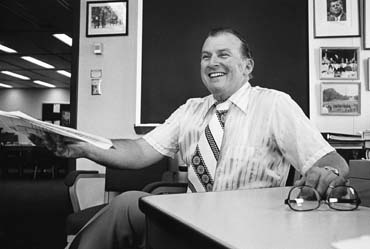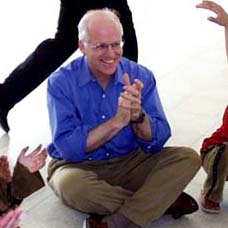
Kauffman, who advocated for a national youth corps during John F. Kennedy's 1960 presidential campaign, served on the staff under R. Sargent Shriver, Jr. that developed the Peace Corps. As the program's first director of training from 1961 to 1963, Kauffman was responsible for the preparation of all volunteers for overseas assignments and developed training programs at more than 60 colleges and universities. He was instrumental in establishing recruitment for the Peace Corps on the UW-Madison campus, which today consistently leads the nation in the number of volunteers recruited for the program.
Obituary for Joseph Kauffman, Peace Corps' first Director of Training from 1961 to 1963
Joseph Kauffman, master administrator and Peace Corps pioneer, dies
September 29, 2006
by Barbara Wolff
Caption: An office portrait of Joseph Kauffman in 1977. Kauffman, a professor emeritus of educational administration, was dean of Student Affairs at the University of Wisconsin from 1965-68. He returned to Madison to teach in 1973 and went on to become executive vice president of the University of Wisconsin System from 1980-83. Photo: courtesy UW-Madison University Archives
Joseph F. Kauffman, emeritus professor of educational leadership at the University of Wisconsin-Madison, master administrator, one of the architects of the Peace Corps, and Dean of Student Affairs at UW-Madison during the turbulent student demonstrations of the 1960s, died today after a courageous battle with cancer. He was 84.
Kauffman was a national expert in college and university leadership. At UW-Madison, he provided counsel to Chancellors John Wiley (2001-), David Ward (1993-2000), and Donna E. Shalala (1988-1993) and to countless university administrators and staff members at all levels. He served the UW System as executive vice president from 1980 to 1983 and contributed significantly to the development of today's UW-Madison faculty and academic staff governance structure. He was in great demand as a consultant at other institutions.
"Joe Kauffman will be remembered as one of the great contributors to the success of this university," says Chancellor John D. Wiley. "Joe was an idealist and innovative thinker who was well ahead of his time in understanding the educational power of service learning. He trained many of the university's top leaders during his long association with the campus. His legacy is alive and well across UW-Madison."
"Joe Kauffman was a scholar and practitioner of higher education administration who managed to make the two parts fit together," Ward says. "From personal experience I can attest that he was very generous as an informal mentor. He was patient and willing to talk with anyone. To me he was a valuable confidant."
"Joe was a remarkable man - and a special friend," says Shalala, currently president of the University of Miami. "He was wise and loyal to his community."
Kauffman joined the UW-Madison faculty as Dean of Student Affairs in 1965 and professor of counseling and behavioral studies in the School of Education. He held those positions until 1968, when he left to become president of Rhode Island College in Providence. He returned to UW-Madison in 1973 as a professor in the Department of Educational Administration (now Educational Leadership and Policy Analysis).
Kauffman was born in 1921 in Providence, R.I., and educated in the public schools in Norwood, Mass. He earned his doctorate in education from Boston University, his master's from Northwestern, and his bachelor's from the University of Denver.
Prior to his initial appointment at UW-Madison, he served in Washington, D.C., as a consultant to the Commission on Academic Affairs, the American Council on Education, and as director of higher education for the American Personnel and Guidance Association. He also was a consultant to the State Department, federal Office of Economic Opportunity and more.
Kauffman, who advocated for a national youth corps during John F. Kennedy's 1960 presidential campaign, served on the staff under R. Sargent Shriver, Jr. that developed the Peace Corps. As the program's first director of training from 1961 to 1963, Kauffman was responsible for the preparation of all volunteers for overseas assignments and developed training programs at more than 60 colleges and universities. He was instrumental in establishing recruitment for the Peace Corps on the UW-Madison campus, which today consistently leads the nation in the number of volunteers recruited for the program.
Kauffman also became a champion of service learning, in which students build on their work in the classroom and receive academic credit for volunteering in community settings around the city, state, nation and world.
Although he retired in 1987, Kauffman continued to have a significant impact on UW-Madison through the Joseph F. Kauffman Administrative Development Program. The seminars, now entering their 19th year, provide a means for current and potential UW-Madison administrators, faculty and staff, to meet informally and discuss the complex issues facing the university and resolve problems they are facing.
Among those mentored by Kauffman was Mary K. Rouse, who was UW-Madison Dean of Students between 1987 and 2000, and director of the UW-Madison Morgridge Center for Public Service from 2000 until her retirement in 2005. Rouse says that Kauffman not only changed the direction of her own life, but also altered the face of higher education.
"He wanted to interest people in higher education, not only on the local, state and national levels but worldwide," she says. "The best thing about his seminars was the way he connected his classes to the Wisconsin Idea. He strongly believed that the campus has a responsibility to disseminate knowledge to improve the condition everywhere, and that education is an important key to improving people's lives."
After she became Dean of Students, Rouse found the public scrutiny associated with the job more intense than she had expected, and difficult to deal with, she says. Kauffman reminded her that "what I really loved was working with students - that was why I had been selected for the position. He told me that if I concentrated on students and student services - my love and strength - I'd be able to survive anything."
People who knew Kauffman often cite his graciousness and generosity. Arthur Hove, special assistant emeritus to the chancellor, has known Kauffman since the mid-60s. "My first contact with Joe came when I was the editor of the alumni magazine. I wrote an article about him and spelled his last name incorrectly - two 'n's instead of two 'f's. He was very gracious about it, and that led to a continuing interchange over the years."
Noting that Kauffman served in the 85th Infantry Division in North Africa and Italy during World War II, Hove says Kauffman often credited the GI Bill, which allowed returning veterans to pursue a college education, for changing the direction of his own life. "He said he personified that bill, that he never would have gone on to college without it," Hove says.
Kauffman made sure his students recognized the value of higher education and its role in the big picture. For instance, Judy Craig, emerita associate dean in the College of Letters and Science, says Kauffman encouraged her to pursue an advanced degree while she was working fulltime.
"He had a real love for the university, and he was able to pass that along," she says. "He also was my major professor - I may have been the last student he escorted to the stage at commencement when I got my Ph.D. in 1986."
His seminars, meanwhile, have become a campus institution, and have continued even when Kauffman himself was unable to lead them. Craig, along with Hove and Joseph Corry, associate vice chancellor emeritus, stepped in when Kauffman was recovering from open-heart surgery.
Kauffman was preceded in death by his wife, Gladys.
"They were a true team," Hove says. "She made a substantial contribution to everything they did, and he always acknowledged it."
His survivors include his daughter, Marsha Krasnow of Boston, and son, Frank of California. Graveside services are scheduled Sunday, at 11 a.m., at Forest Hills Cemetery, Madison.
















